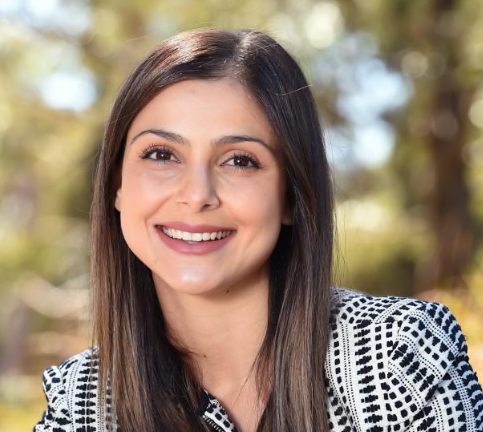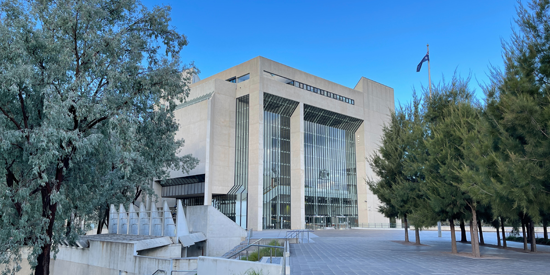How can we better protect sexual offence victim-survivors' privacy and interests during criminal trials? A new Deakin study aims to find out.
Research news
Summary:
- A new Australian Institute of Criminology-backed study will explore how sensitive third-party evidence of sexual offence victim-survivors can be better protected during criminal trials.
- Evidence such as prior sexual experiences, digital materials, counselling notes and school records can potentially re-traumatise and harm the credibility of victim-survivors in court.
- The research team, led by Deakin criminology and sexual violence expert, Dr Mary Iliadis, will conduct a nationwide survey and interview victim-survivors.
Deakin University’s Dr Mary Iliadis will examine one of the most harrowing and re-traumatising experiences for victim-survivors when giving evidence at trial.
In an Australian-first study, Dr Iliadis, alongside Dr Zarina Vakhitova and Dr Delanie Woodlock from Monash University and Associate Professor Michael Salter from the University of New South Wales, will explore ways in which sensitive third-party evidence of sexual offence victims can be better protected during criminal trials. They aim to address what they describe as ’a significant socio-legal problem’ in Australian criminal justice systems.
The study will delve into the current problems surrounding the use of evidence such as medical and counselling notes, phone records, and prior sexual history evidence that is frequently used by defence counsel to challenge victims’ testimony and character.

Deakin University's Dr Mary Iliadis
Does our criminal justice system deter reporting of sexual offences?
Lead researcher, Dr Mary Iliadis, a Senior Lecturer in Criminology and co-convenor of the Deakin Network Against Gendered Violence, said the thought of having private information revealed in court can compound the trauma of victim-survivors as much as the crime itself.
’According to the Australian Bureau of Statistics, almost 90% of women do not report their sexual assault to police. One of the reasons for this is that going to court can be re-traumatising, particularly when their sensitive materials are exposed in court,’ Dr Iliadis says.
’And in Australia, just under 30% of sexual assault reports lead to an arrest, summons, formal caution or other legal action.
‘Through this project, we’ll explore the ways in which sexual offence victims’ sensitive third-party evidence can be better protected, including through the role of what’s known as “trauma-informed victim separate legal representation”.’
What is trauma-informed victim separate legal representation?
What many people may not realise, according to Dr Iliadis, is that throughout the legal process, victims do not have access to their own lawyers to protect their privacy and individual interests at trial. Instead, they are automatically assigned a lawyer through the Director of Public Prosecutions.
Dr Iliadis says this means the victim is not considered a party to legal proceedings, despite being directly impacted by the offence, and therefore does not have an active role or voice, such as in relation to what information is shared during a trial.
’While courts have a duty to protect victims from certain misleading, intimidating and humiliating questioning, such as in relation to victims’ sexual history and character, research shows defence counsels continue to ask these questions to undermine victims’ character and testimony,’ she says.
‘If victims can be assured that their privacy and interests will be protected, they might be more inclined to report and/or stay engaged in the criminal justice system. Having their own lawyer present at trial may also decrease victims’ feelings of stress and anxiety and improve their confidence when testifying.’
Hearing directly from victim-survivors
The project will look at how separate legal counsel and other measures can better protect victim-survivors from intrusive questioning during trial, and from having to hand over evidence that is not of probative relevance to court proceedings.
The research team will seek the views and experiences of victim-survivors through a nationwide survey and interviews, as well as interviews with the victim support sector and defence counsel, and an analysis of trial transcripts where sensitive third-party evidence was subpoenaed.
The project is being supported by specialist women’s and legal services, including WESNET, Women’s Legal Services Queensland and Women’s Legal Services Victoria, and is funded by a Criminology Research Grant administered by the Australian Institute of Criminology.
International approaches to victim protection and support
Dr Iliadis says we can also look to other parts of the world for examples of systematic changes that better protect victims during legal proceedings.
In Ireland, for example, victims are allowed their own separate legal representation if it is apparent that their prior sexual history is likely to be raised by the defence counsel.
‘In Denmark and Sweden, victims of sexual offences also have the right to engage a lawyer from as early as the police reporting stage, to receive advice about the legal process and compensation claims, as well as moral support. In Germany, victims also have a much more powerful role in criminal trials,’ Dr Iliadis says.
‘Closer to home, in South Australia, the Commissioner for Victim’s Rights may appoint separate legal counsel to assist victims during criminal justice proceedings or intervene in cases where the victim’s prior sexual history might become compromised.
‘Queensland and New South Wales also have limited provision for victim legal representation where counselling records are sought by defence counsel.’
Plenty more work to do
Alarmingly, new results from the National Community Attitudes towards Violence against Women Survey showed that one-third of respondents believed women use sexual assault claims as retribution and nearly one in four believe women fabricate allegations because they regret consensual sex.
The survey, established as a key means to monitor progress of the National Plan to End Violence against Women and their Children, is conducted every four years and representative of the community’s understanding of violence against women.
’Attitudes like this show that in the first instance, we need social and cultural change to quash the myths and stereotypes about sexual violence,’ Dr Iliadis says.
’These concerning societal beliefs, compounded by the ongoing failures of the justice system to keep victims feeling safe, prevent victims from reporting and undermine investigations, prosecutions and victim experiences.’
About Dr Mary Illiadis:
- Senior Lecturer in Criminology in the School of Humanities and Social Science
- Research expertise in the areas of domestic, family and sexual violence, victims’ rights, legal representation for victims of sexual offences, and procedural and substantive justice for victim-survivors.
- Victorian Representative for the Australian and New Zealand Society of Criminology.
- 2022 Deakin University Vice-Chancellor’s Early-Career Research Award for Research Excellence.
- 2022 Australian and New Zealand Society of Criminology Outstanding Policing Research Award.
- 2022 World Society of Victimology Benjamin Mendelsohn Award.
- 2020 Australian and New Zealand Society of Criminology New Scholar Prize.
- Invited to deliver a keynote presentation at the 17th International Symposium of the World Society of Victimology in Spain in 2022.
- Research features in government circles, internationally, demonstrating a high-level of impact.
- Regularly called upon by national media organisations, such as the ABC, Herald Sun, The Age, The Conversation.
- Received outstanding recognition of her submission to Northern Ireland’s highly important Gillen Review into The Law and Procedures in Serious Sexual Offences.
- Invited to participate in the consultation process to support the development of a new specialised and trauma-informed legal services pilot for victim and survivors of sexual assault led by the Criminal Justice Reform Taskforce in the Commonwealth Attorney-General’s Department (the department).
- Dr Iliadis’ book, Adversarial justice and victims’ rights: Reconceptualising the role of sexual assault victims, was published by Routledge in May 2020.
If you or anyone you know needs help:
- Sexual Assault Crisis Line: 1800 806 292
- 1800 Respect National Helpline: 1800 737 732
- Lifeline (24 hour crisis line): 13 11 14
- ReachOut at au.reachout.com
The text of this article is licensed under the Creative Commons Attribution (CC BY) 4.0 International license. We'd love for you to share it, so feel free! Please note that images, videos, graphics and logos are not covered by the CC BY license and may not be used without permission from Deakin University or their respective copyright holder. If you have any questions please contact researchcomms@deakin.edu.au. Thanks for reading!
You can find more stories like this at https://www.deakin.edu.au/research/research-news-and-publications. We ask that Deakin University and individuals are appropriately credited and that you include links back to this website. Quotes in this article can be extracted for other articles provided individuals are appropriately credited and you include a link back to the article URL.
Share this story

Key Fact
According to the Australian Bureau of Statistics, almost 90% of women do not report their sexual assault to police.
